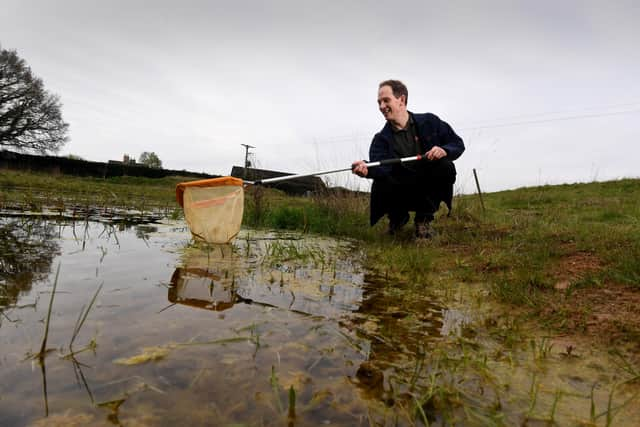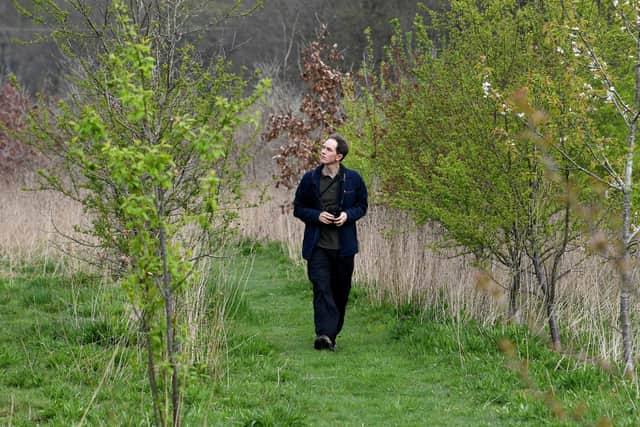How woodland and wildflower meadows on the Escrick Park Estate in Yorkshire are teaching children about nature
I can still see my late father-in-law Brian taking our then very young sons and daughter off on yet another mission to collect frogspawn in either a pond or the River Seven at the caravan site in Rosedale Abbey many years ago. Brian leading the way with our children following on behind with their wellies and shorts on and holding their nets and little plastic buckets.
It’s that spirit of childhood adventure that Rosalind Forbes Adam of Escrick Park Estate has brought the children of today the opportunity to enjoy and learn about ecosystems, even if they don’t know that’s exactly what they have learned until later.
Advertisement
Hide AdAdvertisement
Hide AdRosalind started Three Hagges Woodmeadow, now the flagship of the Woodmeadow Trust, 10 years ago and this year’s events at Escrick include the ever popular annual Woodmeadow Safari Day in July when the whole team of volunteers and environmental specialists will be on hand.


Philip Taylor now masterminds many of the events and the education programme.
“We are concentrating on running workshops covering KS1 and 2 for school trips which our team of volunteers and I run, that tick the science syllabus boxes. It’s all hands-on stuff in a rural environment, something that many have never had the opportunity to experience before. Things like bug hunting and pond dipping, where we make it as interesting and as memorable as possible.
“Schools that come usually have a topic like mini-beasts or food chains to cover and I will give them a little chat about ecosystems, but in a really easy and fun way. I like to use props and demonstrations.
Advertisement
Hide AdAdvertisement
Hide Ad“Recently, one group wanted to know about life cycles, so we did a life cycle demo with a caterpillar made of jelly, showing what happens when it metamorphoses. We then had a session on bug hunting and a team would go searching for bugs, come back and share their finds and then go to the pond where we split the children into teams and each person had a net and spent their time fishing out strange creatures.


“Three Hagges Wood is an amazing place. Right now we are at the start of the flowering season and the mix of woodland and wildflower meadow flowers creates a vibrant picture of colour with bumble bees, dragonflies and every type of insect.
“We cater for all ages of young children too, as Kate McGuire runs Haggelettes where 18 months to 5 year olds come to learn and get involved in bark rubbing, model making and toasting marshmallows around the fire.
Ros has seen just how important Three Hagges Wood can be to children’s and everyone’s greater education over plant life, the food chain and understanding where everything is vital.
Advertisement
Hide AdAdvertisement
Hide Ad“At Woodmeadow Trust we believe that connecting future generations with the natural world is absolutely crucial.
“Education is at the heart of everything we do and our mission is appreciation and greater understanding of the wonders of nature. People and communities have a critical role to play in restoring and safeguarding the natural world.
“Wildflowers are a vital component of any habitat and they form the base of the food chain. A lot of people will have heard of the idea of a food chain where huge quantities of insects are required to feed all of our iconic birds and mammals.
“What a lot of people don’t realise is that lots of insects like butterflies and moths are dependent for their survival on a single plant species for food.
Advertisement
Hide AdAdvertisement
Hide Ad“If we don’t nurture lots of different plants in our woodlands and woodmeadows we’ll lose all our precious species that depend on them.
Philip grew up amongst nature, learning about nature through his parents love of it, taking him to RSPB nature reserves.
“I have always just loved being outside, watching garden birds, gardening, planting flowers, seeing butterflies come and visit. I studied for my degree in Biology with Ecology at the University of East Anglia. The best time I had at university was going out with the Conservation & Wildlife Society and making like-minded friends.
“In my nature-related jobs that followed I discovered my love of bumble bees and pollinating insects and really discovered how much I enjoyed wildlife education, teaching people about it. Funnily enough I never wanted to be a teacher because that was my dad’s job but through volunteering I found teaching was quite fun and now I love it. There is a part of it that allows you to be like a kid, chasing around with a net.
Advertisement
Hide AdAdvertisement
Hide Ad“But there is also something very therapeutic in being outside with nature. Recently, one of the schools that visited said they had seen one of their children who doesn’t normally engage in the classroom environment switched on and focused like never before. That’s what this can do and can bring about our enthusiasts of the future.
Ros is always interested in others who would like to create similar woodmeadows to Three Hagges Wood and to expand on offering children greater experience of the base of the food chain and ecosystems through fun, hands-on experience.
“I cannot believe it is now 10 years since we started and we have achieved so much.
“We have ecologist Dan Carne, Director of the UK Woodmeadow Network running a series of courses for would-be woodmeadow-makers at Three Hagges Woodmeadow and we have just launched a Growing Community Connections programme to encourage others to get involved and set up woodmeadows in their own communities.
Advertisement
Hide AdAdvertisement
Hide AdAny groups interested in setting up a community Woodmeadow project can apply to Woodmeadow Trust through the Growing Community Connections programme for help and support. https://www.woodmeadowtrust.org.uk/our-work/growing-community-connections Applications are open until 11th May 2023.
The Woodmeadow Safari Day is to be held in partnership with Butterfly Conservation, on Sunday 2 July.